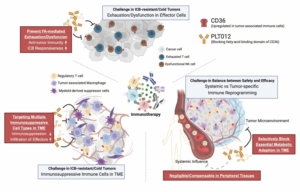
IO Biotech’s cancer jab falls short in Phase 3, but Danish firm still eyes FDA approval
IO Biotech has published top-line results from its pivotal Phase 3 trial evaluating the therapeutic cancer vaccine IO102-IO103 (Cylembio) in combination with pembrolizumab in patients with advanced melanoma. While the combination achieved a notable improvement in progression-free survival (PFS), the study narrowly missed its predefined statistical threshold for significance.
According to IO Biotech, patients treated with the peptidic vaccine–pembrolizumab combination reached a median PFS of 19.4 months compared to 11.0 months in the pembrolizumab monotherapy arm. The hazard ratio was 0.77, with a p-value of 0.056, exceeding the prespecified significance level of p ≤ 0.045.
Subgroup Analysis: A prespecified subgroup of patients who had not received prior neoadjuvant or adjuvant therapy (n = 371) showed a median PFS of 24.8 months on the combination therapy versus 11.0 months with pembrolizumab alone (HR 0.74; nominal p = 0.037).
Among patients with PD-L1–negative tumours, the combination led to a median PFS of 16.6 months, compared to 3.0 months with pembrolizumab monotherapy (HR 0.54; nominal p = 0.006). These results suggest that IO Biotech’s IDO/PD-L1–targeting vaccine could offer a meaningful clinical benefit in specific patient populations, even if the overall trial narrowly missed its statistical benchmark.
Competitive Landscape: IO Biotech’s vaccine approach enters a competitive immunotherapy arena also populated by novel modalities, including bispecific antibodies. Ivonescimab, a PD-1/VEGF bispecific from Akeso Biopharma and Summit Therapeutics, has demonstrated ORRs of 45–55% and median PFS of up to 9 months in early-phase studies in NSCLC. Meanwhile, BNT327, under development by BioNTech and Bristol Myers Squibb, is advancing through Phase 3 in several solid tumours.
Outlook: Although the IOB-013/KN-D18 study did not meet its prespecified PFS threshold, the observed median PFS and favourable subgroup outcomes could support regulatory interest, particularly if overall survival (OS) data mature positively. IO Biotech has stated it will engage in discussions with health authorities once OS data are available.
Whether IO Biotech’s vaccine platform can establish a foothold in the melanoma space will depend on longer-term outcomes, biomarker-driven positioning, and how it differentiates from increasingly sophisticated immunotherapeutic strategies currently in development.


 Gilead Science
Gilead Science Anocca AB
Anocca AB Pilatus Biosciences
Pilatus Biosciences